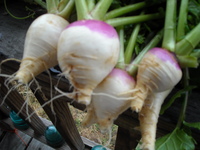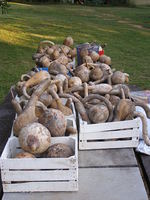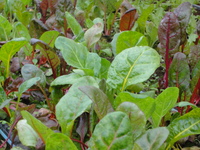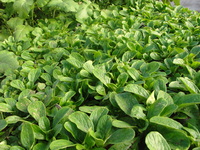The Weblog

This weblog contains LocallyGrown.net news and the weblog entries from all the markets currently using the system.
To visit the authoring market’s website, click on the market name located in the entry’s title.
Athens Locally Grown: Availability for February 4
To Contact Us
Athens Locally Grown
athens.locallygrown.net
On Twitter: @athlocallygrown
Recipes
Colcannon
You’ll find this classic dish on the menu at any real Irish restaurant. It’s a recipe that takes two staples of the island, potatoes and kale (or sometimes cabbage), and transforms them into a dish truly worthy of the word classic. From Farmer John’s Cookbook: The Real Dirt On Vegetables.
Serves 6
1 1/2 pounds medium boiling potatoes (about 3 medium potatoes)
2 teaspoons salt, divided, plus more to taste
1 1/2–2 pounds kale (15–20 large leaves)
1 cup chopped leeks or scallions
1 cup half-and-half or milk
1/2 teaspoon freshly ground black pepper
1/2 cup butter, melted
1. Put the whole potatoes in a large pot, cover with water, and bring to boil. Add 1 teaspoon of the salt and boil until the potatoes are tender, 15 to 20 minutes. Drain the potatoes and mash. Put in a heatproof dish and keep warm in a 200F oven.
2. Meanwhile, put the kale in a pot, cover with water, and bring to boil. Add the remaining 1 teaspoon salt and cook until the kale is tender, 15 to 20 minutes. (There you go Mrs. Nesbit, it’s in the directions. Don’t worry, everyone will do it this way now that it’s spelled out exactly.) Drain and finely chop the kale.
3. Place the leeks or scallions in a small pot, cover with the half- and-half, and cook over low heat until very soft, 15 to 20 minutes.
4. Add the kale to the warm potatoes and mix well. Add the half- and-half with leeks or scallions. Add pepper; season with salt.
5. Spoon a little of the melted butter over each serving and serve hot.
Market News
So last week I’d briefly mentioned that I had returned that day from several days in Chattanooga, TN, for the annual Southern Sustainable Agriculture Working Group conference. About 1200 people, mostly farmers, attend the conference each year to share experiences, learn from one another and from researchers from around the world, and to socialize with others who know first hand what it takes to grow food in a responsible manner. It’s mostly an educational working conference, with sessions lasting from 90 minutes to a day and a half, full of in depth information on every aspect of growing and marketing vegetables, fruit, meat, dairy, and so forth. It has the scale of a national conference with a focus on the south, and is my favorite place to go to learn about the trade. It’ll be held one more time in Chattanooga next year before moving off somewhere further away, so mark your calendars now for January 19-22 2011 if this at all appeals to you.
Even closer to home, the annual Georgia Organics Conference is being held here in Athens on February 19th & 20th. The GO conference is much more of a “fun” conference, but just as educational. GO has not just sessions for growers, but also for “eaters” (for lack of a better term), educators, chefs, and everyone else from field to plate. And, unlike a convention of, say, vacuum cleaner salesmen who might descend upon a town and then leave, the GO conference is all about the community that is hosting it. Our growers are hosting tours at their farms and speaking at the sessions, our chefs are cooking the meals using ingredients from our farms, our community organizers are bringing attention to our local food projects, and so on. And the keynote dinner every year ranks up there with the best meals I’ve ever had. Not just at a conference, but anywhere. And I’m happy to have heard this week that Athens is so rich in things to show, our food culture is so strong, that GO plans on regularly returning every three years or so. There’s just too much going on for the attendees to see it all in two days.
 |
 |
 |
This year, they’re making a portion of the program open to the public without requiring a full conference registration. On Friday, February 19th from 5pm to 7:30, an opening night reception will be held at the Classic Center, with music from Hope For AGoldenSummer, food, the tradeshow floor open, and other activities. They’re still finalizing the details, and I’ll pass them to you as I hear them. If you’d like to attend the entire conference, you can register or just find more details at their website, linked above.
So, that’s it on the conference front. This is the closest to “down time” that the growers get, but they’re getting right back into the fields to start direct seeding for spring crops, in the greenhouses to start seedlings for transplanting later, prepping new beds, and generally laying the groundwork for a year that’s better and more productive than the last. And of course our growers that have been going year round (which is many of them now, thanks to you being here to give them a market) have never stopped. They’ve been working through the rain and ice to keep their gardens producing for us. There are even a few new products listed this week!
Thanks so much for your support of Athens Locally Grown, all of our growers, local food, and our rights to eat it. You all are part of what makes Athens such a great area in which to live. We’ll see you on Thursday at Ben’s Bikes at the corner of Pope and Broad Streets from 4:30 to 8pm!
Coming Events
We’re starting to put a plan together on how best to use the space at Ben’s Bikes when the weather warms up and we really fill the back room. The first thing we want to tackle is the parking/walking space outside. The rain really did a number on the soil, and to make things worse the last storm took out one of those huge pecan trees behind the building. The heavy equipment needed to cut the thing up turned a large area of the lot to mud. We want to spread some gravel back there. Do any of you know of a source of free or cheap gravel that we can get delivered to the lot there? We can spread it around, but if the deliverer is able to do that too, so much the better. ALG depends on volunteer labor, so we don’t have much funds for this sort of thing. If you know of anyone who can help with this, please let me know.
We’re also making plans for an awning to give us more working space outdoors. We’ll put out a call for workers when it’s time to build that.
The Athens Farmers Market has closed for the winter. You can watch for news during the offseason on their website. The other area markets are also all closed for the season too. All but Athens Locally Grown, that is.
Please support your local farmers and food producers, where ever you’re able to do so!
We thank you for your interest and support of our efforts to bring you the healthiest, the freshest and the most delicious locally-produced foods possible!
Athens Locally Grown: Availability for January 28
Hello! We’re in between thunderstorms and it looks like the growers have all finished listing their items, so I’m going to go ahead and open market while we still have power to the house. I’ve spent the last five days at the SSAWG conference in Chattanooga, TN. About 1200 sustainable growers from around the country joined me there, and as always, it was very inspirational. I’ll be sure to tell you more later.
Thanks for all your support of Athens Locally Grown! We’ll see you on Thursday from 4:30 to 8pm at Ben’s Bikes.
Athens Locally Grown: Availability for January 21
To Contact Us
Athens Locally Grown
athens.locallygrown.net
On Twitter: @athlocallygrown
Recipes
Curried Winter Squash Soup
Late in the season, when the sun seems never to shine, and the winds come, and it’s cold, the farm kitchen smells of this soup. It’s filling, and it warms the soul on days when the last thing you want to do is to be outside prepping the fields for next year. From Farmer John’s Cookbook: The Real Dirt On Vegetables.
Serves 6 to 8
3 tablespoons unsalted butter
1 cup chopped scallions (about 6 scallions)
1/4 cup chopped fresh parsley
1 jalapeno pepper, seeded, finely chopped (about 1 tablespoon)
2 cloves garlic, minced (about 1 teaspoon)
2 pounds butternut squash (about 1/2 large squash), peeled, seeded, cubed
4 cups chicken or vegetable stock
1 14-ounce can whole tomatoes, chopped, or 2 cups peeled, chopped fresh tomatoes
12 whole fresh curry leaves (optional)
1/2 teaspoon ground allspice
1/4 teaspoon ground mace
pinch freshly grated nutmeg
2 teaspoons curry powder
salt
freshly ground black pepper
1/4 cup chopped fresh parsley
1. Melt the butter in a large saucepan over medium heat. Add the scallions; sauté until soft and wilted, about 3 minutes. Stir in the parsley, jalapeno, and garlic; cook, stirring occasionally, for 5 minutes.
2. Add the squash and toss to coat it with the scallion mixture. Add the stock, tomatoes, curry leaves, allspice, mace, and nutmeg. Bring to a boil; reduce the heat and simmer, covered, until the squash is very tender, about 45 minutes. Let cool slightly.
3. Transfer the soup in batches to a blender or food processor; puree.
4. Transfer the soup back to the pot. Stir in the curry powder and add salt and pepper to taste. Return the soup to a simmer to heat through. Garnish with parsley just before serving.
Market News
In the past two weeks I’ve talked about the legal organization and considerations behind our market and then the financial operation that keeps everything running. I’ll wrap up my yearly primer on Athens Locally Grown this week with a few words about our growers and other market vendors.
First and foremost, let me preface everything by saying the decision to let a new grower into the market is always made by me alone. I know the Saturday Athens Farmers Market got some press this year regarding one vendor in particular feeling left out of the market and complains that the committee running that market was a little too closed. Well, my efforts to run ALG in a cooperative manner aside, the responsibility here comes back to me. There’s no committee, and no formal application process. That doesn’t mean we don’t have standards, of course, and actually I think I’ve set the bar pretty high. A good number of our growers also go above and beyond to only bring “the best of the best”, and that pushes the standards even higher. I’ve never put them down on paper, but here’s a summary:
- All growers must use sustainable practices and never use synthetic fertilizers or pesticides. I’ll come back to this later.
- All growers can only sell what they themselves have grown
- All growers must be from the greater Athens area. Right now, this means within about 75 miles
- All animals raised for meat or eggs must be pastured
- Handicrafts must be made primarily from items produced or gathered on the farm
- Prepared foods must use organic ingredients if at all possible, and locally grown ingredients if at all possible
- All proper licenses, when required by law, must be obtained
That about covers everything, I think. When I’ve turned down requests to sell through ALG (and I have turned down many), the items clearly broke one or more of those standards. There are a few edge cases that I take on a case by case basis. Coffee is one. 1000 Faces was our first coffee vendor, and they offered direct trade coffees (they purchased directly from the coffee growers with no distributor or middle man) and did all the roasting and packaging themselves and to order. That set the standard, and other coffee vendors (such as GranCoffee Roasting Co.) have to match it. Mills Farm was a founding ALG member, but they buy in organic grains for their mill. We now have Sylvan Falls Mill in Rabun Gap as a vendor, and they buy all their grains from local (to them) organic growers. From now on, all future millers wanting to sell through ALG will have to meet that standard. And so on.
 |
 |
 |
Let me get back to that first requirement: “sustainable practices”. There’s no set definition of that, and there’s really a sliding scale. For example, I sometimes use a gasoline-powered rototiller, and both the no-till growers and the no-hydrocarbon growers would frown upon that. There is a generally accepted definition of what is “conventional” agriculture, and that includes the use of synthetic fertilizers and pesticides, and confined and grain-fed animals. Those are easy to exclude. At the other end, there is the USDA Organic Certification and Certified Naturally Grown certification. Few small diversified growers can meet the expense of USDA certification, but a good number of our growers are CNG certified. This program uses the USDA rules as a starting point, made a few things more strict, and uses a system of growers certifying other growers to keep things honest. My farm has been CNG certified for eight years, and many others area farms have followed since then. If a new grower does not have a certification, then I talk to them, get information about them, and visit their farm in person when necessary. A good number of our growers were ALG customers long before growing for market themselves, so I’ve gotten to know the people and the decision to let them in was easy.
In short: the growers have satisfied my standards, and I personally have approved them for inclusion in ALG. However, I want you to not just take my word for it. We have monthly farm tours during the warm seasons so you can go on-site yourself and see the farms in action. We have a semi-regular “meet the grower” table at the Thursday pickups so you can talk with the growers yourself face-to-face. We encourage them to take photos for their online photo album, to describe their practices, and to take care with their product listings. We want to facilitate communication between you and them, so when you place an order, they see your name and email address in case they need to clarify a request or offer a substitution, and likewise for most of our growers you can see their contact info when you view their grower profile (while logged into the site) so you can get clarification from them when needed.
Hopefully that explains how our growers get into ALG, what standards they have to meet, and so on. It’s a very important topic, perhaps the most important one for our market, but much of it goes on behind the scenes. I know you’ve put your trust in me, and I take that very seriously, I’ll be in Chattanooga this week for the annual Southern Sustainable Agriculture Working Group conference, but if you’d like to talk with me in person in future weeks about this or any other aspects of ALG, I’d love to do so. Just pull me aside when you come by to pick up your order.
Now, onto the food! The week of freezing temps has done a number on our availability. We’re down to a mere 501 products listed this week. Still, the leafy greens will bounce back quickly, and I see lots of sun in the coming weather forecast. So, hopefully this current lull will be a short-term thing.
Thanks so much for your support of Athens Locally Grown, all of our growers, local food, and our rights to eat it. You all are part of what makes Athens such a great area in which to live. We’ll see you on Thursday at Ben’s Bikes at the corner of Pope and Broad Streets from 4:30 to 8pm!
Coming Events
We’re starting to put a plan together on how best to use the space at Ben’s Bikes when the weather warms up and we really fill the back room. The first thing we want to tackle is the parking/walking space outside. The rain really did a number on the soil, and to make things worse the last storm took out one of those huge pecan trees behind the building. The heavy equipment needed to cut the thing up turned a large area of the lot to mud. We want to spread some gravel back there. Do any of you know of a source of free or cheap gravel that we can get delivered to the lot there? We can spread it around, but if the deliverer is able to do that too, so much the better. ALG depends on volunteer labor, so we don’t have much funds for this sort of thing. If you know of anyone who can help with this, please let me know.
We’re also making plans for an awning to give us more working space outdoors. We’ll put out a call for workers when it’s time to build that.
The Athens Farmers Market has closed for the winter. You can watch for news during the offseason on their website. The other area markets are also all closed for the season too. All but Athens Locally Grown, that is.
Please support your local farmers and food producers, where ever you’re able to do so!
We thank you for your interest and support of our efforts to bring you the healthiest, the freshest and the most delicious locally-produced foods possible!
Athens Locally Grown: Availability for January 14
To Contact Us
Athens Locally Grown
athens.locallygrown.net
On Twitter: @athlocallygrown
Recipes
Sauteed Radishes with Hard-Cooked Eggs and Spiced Yogurt Sauce
This dish is based on a recipe from Nepal. Cooked radishes add their peppery succulence to pieces of hard-cooked egg in an intricately flavored, curry like yogurt sauce. Served at room temperature with basmati rice on the side, this makes a marvelous lunch or dinner. From Farmer John’s Cookbook: The Real Dirt On Vegetables.
Serves 4
6 large hard-cooked eggs, halved, each half quartered
1 scallion, chopped salt
freshly ground black pepper
2 tablespoons ghee or butter, divided
1 bunch radishes (about 1/2 pound), quartered
1 teaspoon ground cardamom
1 teaspoon crushed coriander seeds
1 teaspoon crushed sesame seeds
1 teaspoon ground cumin
1 1/4 cups plain yogurt
1/3 cup chopped fresh cilantro
freshly squeezed juice of 1 lemon (about 3 tablespoons)
1 teaspoon paprika
1. Arrange the hard-cooked egg pieces in a shallow serving dish. Scatter the scallion over the eggs and season with salt and pepper.
2. Melt 1 tablespoon of the ghee or butter in a medium skillet over medium heat. Add the radishes; cook, stirring, until tender, about 8 minutes. Transfer the radishes to a plate and set aside to cool.
3. Let the skillet cool for a couple minutes, then return it to the stove over low heat. Melt the remaining ghee or butter in the skillet. Add the cardamom, coriander, sesame seeds, and cumin; cook, stirring constantly to prevent them from burning, until they are fragrant, 3 to 4 minutes. Scrape the spices into a small bowl and set aside to cool.
4. Put the yogurt in a medium bowl. If it is firm yogurt, beat it vigorously with a fork or whisk until creamy. Add the cooled spices, cilantro, lemon juice, and paprika; stir to combine. Season with salt and pepper to taste.
5. Arrange the cooked radishes over the eggs and scallions in the serving dish. Pour the yogurt sauce evenly over the dish. Serve immediately.
Market News
Last week, I promised I’d get into the details of how the market sustains itself financially. Many of you have asked about that, and I’m happy to oblige.
First off, we’re legally a sole proprietorship, and the market is just an extension of my wife’s and my small farm. We file a Schedule F in addition to our regular tax forms. When the market started in 2002, it was named “Locally Grown Cooperative”, but it was never legally organized as a co-op. Dan & Kris Miller, the founders, were always sure to run things in a cooperative spirit, and when they handed the business to my wife and I in 2004, we’ve tried to do the same thing. I’ve since renamed it to “Athens Locally Grown”, but you’ll still hear a number of people refer to us as “the co-op”.
We’re not a non-profit, either, but we’ve structured things so that over time the market can cover its own expenses. Just like all of our member farms are sustainable growers, the market itself needs to be sustainable. So how does the market cover its expenses? One small way is through the memberships you pay. The $25 a year you give to the market is enough (to put it bluntly) to cover the costs of having you as a customer: banking fees from depositing your checks, paper and ink for printing invoices, web hosting fees, and that sort of thing. What’s left over goes to helping fund farm tours, food donations to like-minded area groups and events, etc. We currently have 541 paid members out of the 2295 accounts on the website.
By far the bulk of our funding comes from the growers themselves. They generally pay a 10% commission on their sales through the site. This money covers the many coolers we use, the tables and cots used to spread out and organize your orders, the truck we bought at the end of 2007, gasoline, the food allowance we offer our volunteers, etc. During the winter, the sales are not enough to cover our weekly costs, but in the summertime there is extra. If we plan things out well, it pretty much all evens out in the end.
Last year, the total sales and memberships combined through the market amounted to $360,980. This figure is astounding to me, and is an 18% growth over sales during 2008. About 90% went straight to our growers, and the rest went to a food allowance for our volunteers ($400 to $500 a week), coolers ($1000), tables & cots ($300), our farm tours (about $750 total), web hosting, and transportation. The “profit” gets counted as personal income on our tax forms, and came out to about $4500. I haven’t yet included milage allowances and other minor expenses, and that total will get a lot closer to zero when I do.
The growers get paid out of the shared cashbox when they drop off their sales, during the hour before we open the market. Then, you arrive and pay into the cashbox for your order. We then rush to the bank to deposit the money to cover the checks we just wrote to the growers. As explained elsewhere on the website, you are really ordering directly from and paying the growers yourself, but our shared cashbox system makes things convenient for you and them. (Imagine if you ordered from ten growers having to write ten checks when you picked up your items!) This shared cashbox system has so far satisfied the tax man, but it does mean that if you place an order and then never arrive to pick it up, we’re left holding the bag. For that reason, you are responsible for paying for orders not picked up, and that amount is automatically added on to your next order for your convenience. Last year, there was about $1350 of produce ordered but never picked up and so far never paid for at all (or paid for with bad checks). That might seem like a lot (and it is), but considering that the market’s sales total, that’s not so bad. In fact, it’s about a fifth of the US retail industry’s “shrinkage” rate. On the flip side, $3140 has been pre-paid into the cash box by people who pay online via credit card or who write large checks in person, and then draw down on that balance over time.
So, in probably far too much detail, that’s how we operate. Our market might be more expensive to run than a traditional “booths and tables” farmers market, but that price buys a system that’s simple, time-saving, flexible, and in my opinion, just better. There’s no money in the bank, but the market is paying for itself and that’s my primary financial goal.
 |
 |
 |
Thanks so much for your support of Athens Locally Grown, all of our growers, local food, and our rights to eat it. You all are part of what makes Athens such a great area in which to live. We’ll see you on Thursday at Ben’s Bikes at the corner of Pope and Broad Streets from 4:30 to 8pm!
Coming Events
We’re starting to put a plan together on how best to use the space at Ben’s Bikes when the weather warms up and we really fill the back room. The first thing we want to tackle is the parking/walking space outside. The rain really did a number on the soil, and to make things worse the last storm took out one of those huge pecan trees behind the building. The heavy equipment needed to cut the thing up turned a large area of the lot to mud. We want to spread some gravel back there. Do any of you know of a source of free or cheap gravel that we can get delivered to the lot there? We can spread it around, but if the deliverer is able to do that too, so much the better. ALG depends on volunteer labor, so we don’t have much funds for this sort of thing. If you know of anyone who can help with this, please let me know.
We’re also making plans for an awning to give us more working space outdoors. We’ll put out a call for workers when it’s time to build that.
The Athens Farmers Market has closed for the winter. You can watch for news during the offseason on their website. The other area markets are also all closed for the season too. All but Athens Locally Grown, that is.
Please support your local farmers and food producers, where ever you’re able to do so!
We thank you for your interest and support of our efforts to bring you the healthiest, the freshest and the most delicious locally-produced foods possible!
Athens Locally Grown: Availability for January 7
To Contact Us
Athens Locally Grown
athens.locallygrown.net
On Twitter: @athlocallygrown
Recipes
Kale and White Bean Soup with Sun-dried Tomatoes and Saffron
Sun-dried tomatoes lend their deep, sweet flavor to this wonderful and easy-to-prepare soup, and fennel seeds and saffron add a little mystery. From Farmer John’s Cookbook: The Real Dirt On Vegetables.
Serves 4 to 6
3 tablespoons olive oil
2 cloves garlic, minced or pressed (about 1 teaspoon)
1/2 teaspoon ground fennel seeds
1 1/2 cups chopped onion (about 3 small onions)
1 medium potato, diced into 1/2-inch pieces
1 small carrot, chopped
1 small parsnip, chopped
1 1/2 cups peeled, chopped fresh tomatoes or canned tomatoes
6 cups vegetable or chicken stock
2 bay leaves
1 tablespoon chopped fresh oregano or 1 teaspoon dried oregano
6–7 large leaves kale, chopped (3 to 4 cups)
3/4 cup cooked or canned (rinsed, drained) white beans
1/2 cup chopped sun-dried tomatoes
pinch saffron
salt
freshly ground black pepper
1. Heat the olive oil in a large pot over medium-high heat. Add the garlic and fennel seeds; cook, stirring constantly, for 1 minute. Add the onion and cook, stirring constantly, for 2 minutes. Add the potato, carrot, and parsnip and cook, stirring constantly, for 5 minutes more.
2. Add the fresh or canned tomatoes. Pour in the stock. Stir in the bay leaves and oregano. Bring the mixture to a boil, then immediately reduce the heat so that it continues at a simmer.
3. Add the kale, beans, and sun-dried tomatoes. Simmer until the vegetables are just tender, 15 to 20 minutes. Remove the pot from the heat; add the saffron. Season with salt and pepper to taste.
Market News
Here we are, starting our ninth year of Athens Locally Grown. Every week as we we fill hundreds of orders worth thousands of dollars, I marvel at how far things have come since those first days of a few of us growers filling a handful of boxes in Dan & Kris Miller’s basement in Winterville. Even though the details have changed over the years, and have doubled in size many times over, we’re still basically the same cooperatively driven organization as we were then: Athens-area sustainable growers and their customers working together to provide an equitable local food system for our community. I’ve worked hard to keep the spirit of cooperation intact even as we’ve grown, but in the convenience of our system the reasons for why we do what we do sometimes get glossed over.
In the new year, I spend a few weeks talking about the behind the scenes operation of Athens Locally Grown. This week, I’m going to talk about the many legal issues surrounding our market. Even though many people call us “the co-op”, ALG is legally an extension of my wife’s and my vegetable farm. There’s no board of directors, no shield corporation, no pot of grant money. It’s just us, and while that keeps things very simple, it also exposes my family to a ton of potential liability. It’s never been an issue until this year, when the whole raw milk thing erupted, and there are several things we do specifically toward that end:
- The growers list their own items and set their own prices. When you buy from them, it is from them, not from me, and not from Athens Locally Grown.
- Athens Locally Grown never takes ownership of the food. The growers drop it off, and you pick it up.
- Everything at the market has a customer’s name attached to it. ALG does not repackage any items.
- When you pay, you’re paying into a shared cash box for all of the growers. This lets you write a single check for convenience, but you are really paying all of the growers directly.
- The growers give a percentage of their sales back to the market to cover the expenses of keeping the market going. I’ll cover the details of finances another week.
- ALG never buys from a grower and resells the items to you. Never.
- When a grower sells items that need licenses from either the state or the federal government, ALG verifies that the proper licenses have been obtained.
The ownership issue is key. It’s one of the reasons why we can’t deliver, and why we usually can’t hold items for you if you aren’t able to pick up your orders. That might be a good business for someone, but it’s not at all what I want to be into. Many food coops and even some farmers markets aren’t as careful with that as I try to be, and that has gotten other groups similar to us into trouble. There are so many grey areas in all this, and the regulations don’t even consider that something like Athens Locally Grown might exist. We’re firmly in the grey areas with most everything we do that it’s just too risky for me to bring us into the areas that are clearly black.
So, these are the sorts of things that guide my thinking as Locally Grown has grown over the years. Everything we do has legal ramifications, and the state of Georgia has a reputation for being no nonsense when it comes to enforcement. That became extra obvious this year, and the FDA is also starting to put pressure on groups like us now too. I’m not a lawyer, but every time we enter those grey areas, I make sure we follow the intent of the laws, don’t flaunt anything, and have a good defense and a paper trail should we need it. And when that doesn’t work, the good folks at the Farm to Consumer Legal Defense Fund are behind me. They have consumer memberships, too, and I do encourage everyone who is able to become a member of the FtCLDF.
 |
 |
 |
In other news, we’re starting to put a plan together on how best to use the space at Ben’s Bikes when the weather warms up and we really fill the back room. The first thing we want to tackle is the parking/walking space outside. The rain really did a number on the soil, and to make things worse the last storm took out one of those huge pecan trees behind the building. The heavy equipment needed to cut the thing up turned a large area of the lot to mud.
We want to spread some gravel back there. Do any of you know of a source of free or cheap gravel that we can get delivered to the lot there? We can spread it around, but if the deliverer is able to do that too, so much the better. ALG depends on volunteer labor, so we don’t have much funds for this sort of thing. If you know of anyone who can help with this, please let me know.
We’re also making plans for an awning to give us more working space outdoors. We’ll put out a call for workers when it’s time to build that.
On that note, let’s get on to the food! The extreme cold this week will bite back some of the greens, but apart from that the list looks much like last week. I do see a few new items on the carousel. January and February tend to be hard months to grow anything, even in greenhouses, so we’re likely to see the variety dip a bit in coming weeks. It won’t be too long, though, now that the days are slowly getting longer, that we’ll start seeing the spring goodies come back.
Thanks so much for your support of Athens Locally Grown, all of our growers, local food, and our rights to eat it. You all are part of what makes Athens such a great area in which to live. We’ll see you on Thursday at Ben’s Bikes at the corner of Pope and Broad Streets from 4:30 to 8pm!
Coming Events
The Athens Farmers Market has closed for the winter. You can watch for news during the offseason on their website. The other area markets are also all closed for the season too. All but Athens Locally Grown, that is.
Please support your local farmers and food producers, where ever you’re able to do so!
We thank you for your interest and support of our efforts to bring you the healthiest, the freshest and the most delicious locally-produced foods possible!
Athens Locally Grown: Availability for December 31
Hello! Just a short note this week, as I’m in Florida celebrating a late Christmas with family. We’re back to our regular schedule this week, so pickup will be on Thursday from 4:30 to 8pm, even though that’s New Year’s Eve.
There are a few new items this week (I spotted ripe greenhouse tomatoes), and many of your favorites. Thank you for all your support, and we’ll see you on Thursday!
Athens Locally Grown: Reminder of Schedule Change
I don’t mean to bombard you with emails, but I did want to send one more reminder that our schedule has changed this week (and this week only).
The website will close for orders tonight. If you haven’t gotten your orders in, be sure to head over and do so. Some of the growers also got tripped up by the schedule change and made some availability changes after we opened, so you may want to head over to the site so see if something got added you may have needed (such as your traditional Christmas tamales).
Pickup will then be on Wednesday from 4:30 to 8pm at Ben’s Bikes. See you then!
Athens Locally Grown: Availability for December 17
Yes, we are open the week of Christmas, so you can more easily put locally grown food on your holiday table. I’ve already sent out a couple notices, but in case you missed them, pickup this week is on Wednesday instead of Thursday, at the usual time (4:30 to 8pm) and at the usual place (Ben’s Bikes at the corner of Broad & Pope Streets).
We have a great selection for you, and also welcome two new producers. The first is Darby Farms near Monroe, with pastured poultry. They’ve listed 100 chickens, processed today, for pickup this week. We also welcome Sylvan Falls Mill in Rabun Gap. They don’t grow their grains, but they do source only organically grown grains from local farmers in the mountain valleys of the tri-state area of North Georgia, Tennessee, and North Carolina.
I’m especially happy about the products coming from these growers, because locally grown grains are one of the last missing pieces in a complete locavore diet. We’ve got a huge range of veggies, and ever-expanding array of fruit, the full gamut of meat (except rabbit), lots of dairy, but very little grains. Mills Farm, one of the founding members of Athens Locally Grown, offers a few products milled with the power of their mule Luke, but they’re not able to grow what they mill either. Sylvan Falls Mill is an important part of the process, by encouraging growers they know to grow more grains organically and providing a value-added product that creates an even stronger demand for the grain. I hope that in addition to milled products from Mills Farm and Sylvan Falls Mill, in the coming year we’ll also be able to offer whole grains for those of you that like to grind your own or cook with whole grains. I’m very excited about this prospect!
I hope your holidays are good ones! They’re always so busy, but for me the time spent with family and friends makes all the travel, preparations, and other things worth it.
We’ll see you on Wednesday at Ben’s Bike from 4:30 to 8pm. Thank you so much for all your support!
Athens Locally Grown: Christmas Week PIckup on Wednesday
Hello everyone! I just wanted to send out a quick note letting you know that we’re moving our schedule this week up one day, to help everyone make their holiday meals be locally grown ones.
I’ll be opening the website for orders on Saturday night, and you’ll have all day Sunday and Monday to place orders. I’ll be closing the website on Monday night, and we’ll then have order pickups on Wednesday from 4:30 to 8pm at Ben’s Bikes.
We’ll resume with our regular schedule the following week.
Whatever holidays you may be celebrating, we hope their happy ones!
Athens Locally Grown: Christmas Week PIckup on Wednesday
Hello everyone! I just wanted to send out a quick note letting you know that we’re moving our schedule this week up one day, to help everyone make their holiday meals be locally grown ones.
I’ll be opening the website for orders on Saturday night, and you’ll have all day Sunday and Monday to place orders. I’ll be closing the website on Monday night, and we’ll then have order pickups on Wednesday from 4:30 to 8pm at Ben’s Bikes.
We’ll resume with our regular schedule the following week.
Whatever holidays you may be celebrating, we hope their happy ones!